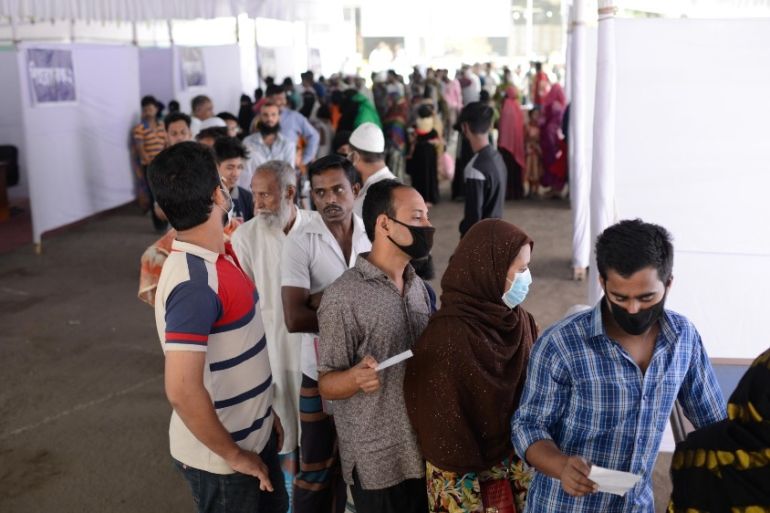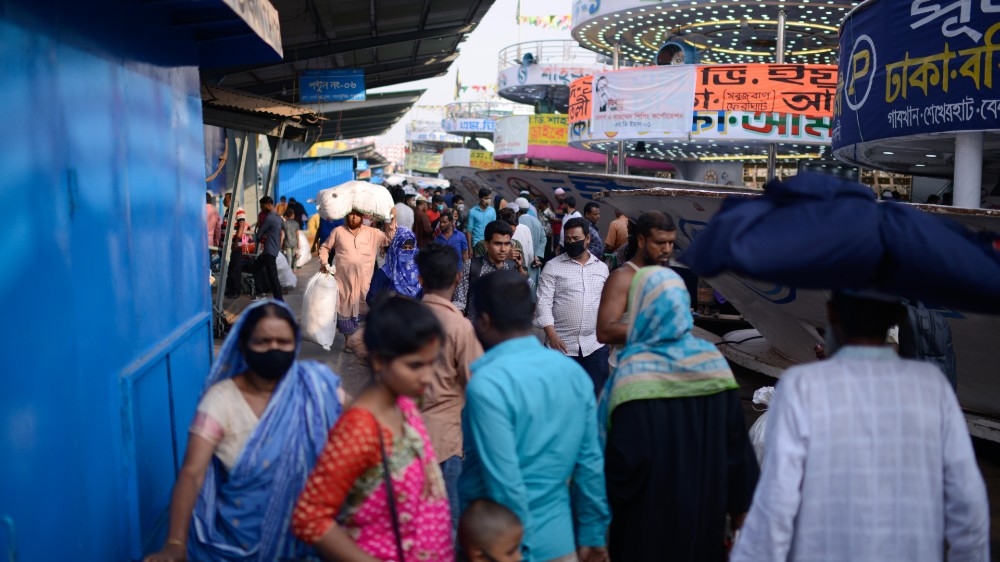Coronavirus: In dense Bangladesh, social distancing a tough task
Measures to prevent COVID-19 faces challenge in Bangladesh – one of the poorest and densest countries in the world.

Dhaka, Bangladesh – The new coronavirus has forced countries around the world to adopt measures such as flight bans, mandatory lockdowns and social distancing to prevent the pandemic from spreading.
South Asian nation of Bangladesh has also followed suit, banning flights and shutting down schools and colleges but offices still remain open in one of the poorest countries in the world.
Keep reading
list of 3 itemsSouth Asia snapshot: How bad is the coronavirus outbreak?
Coronavirus: Travel restrictions, border shutdowns by country
On Thursday, the country detected three more cases of COVID-19, taking the total number of infected people to 18. A 70-year-old man died of the disease on Wednesday.
But for people in the densest country on earth, social distancing is a difficult task while commuting in crowded public transport or living in cheek-by-jowl urban slums.
Huddling inside a Tempo – a makeshift human haulier that sits up to 14 passengers – on a Dhaka road, Abdullah Yusuf was brooding on his helpless condition on Wednesday.
Crowded transport and cheek-by-jowl slums
The 27-year-old, who works as a technician at an industrial chemical laboratory, needs to commute from his Rayerbazaar home in Dhaka to office in Tejgaon. He uses Tempo, the cheapest mode of transport, to cover some 5km (3 miles) distance between his home and office.
In a densely populated country like Bangladesh, you can't enforce social distancing in many areas
“People are talking about maintaining social distancing and personal hygiene to stop COVID-19 outbreak,” Yusuf told Al Jazeera. “Inside a crowded Tempo, those warnings seem futile as we don’t have any option but to sit in a cheek-by-jowl distance.”
With an income of less than $250 a month, Yusuf cannot afford to rent an auto-rickshaw or use taxi-hailing services to make the daily commute. “Our office doesn’t allow us to work from home. We need to go out every day.”

The South Asian nation with 170 million people has shut down all of its educational institutions from March 17 until March 31. The country has also banned incoming flights from the European destinations.
However, with no “total lockdown” order imposed by the government, millions of people like Yusuf are out on the roads every day, especially in the capital Dhaka – home to some 18 million people.
For a city as dense as Dhaka, maintaining social distance – as suggested by the World Health Organization (WHO) to stop the coronavirus spread – seems like a chimera.
Even staying at home is barely proven to be efficacious in Dhaka – a city with no less than 23,334 people living per square kilometre.
Nadia Tabassum Khan has been working from home for the past one week as her office, a multinational market research firm, allowed their employees to avail the facility.
“Our contractual housemaid however, is making a daily visit to our house from outside,” 36-year-old Khan told Al Jazeera.
Khan’s housemaid Sulema Begum, a 34-year-old with beetle leaf stained teeth, barely has any idea about the magnitude of coronavirus outbreak. She hardly knows about the pandemic that has infected more than 200,000 people worldwide and killed nearly 10,000 people.
In her slum at Beribandh in the south of Dhaka, where at least 20,000 people live in extremely close quarters, with most residents little aware of the threat due to the disease.
“We have seen on the TV that people are washing hands and advise everyone to do the same. A bottle of hand wash costs more than 120 takas (about $1.4). It is hard for me to afford it,” said a nonchalant Begum.
“Besides, in the slum, there is one toilet for every 10 families. We don’t even have a regular water supply in the toilet,” Begum added.
‘Can’t enforce social distancing’
Dr ANM Nuruzzaman, a physician who was earlier a director in the Directorate General of Health Service, told Al Jazeera that practising social distancing in a country like Bangladesh is “next to impossible”.
“Social distancing is a way of controlling infectious disease. But in a densely populated country like Bangladesh, you can’t enforce social distancing in many areas.”
“Especially, consider the slums in Dhaka and Chattagram where millions of people live. They are living in such close quarters that it’s unthinkable to enforce social distancing there.”
The government has said it has all the necessary preparations to tackle the COVID-19 outbreak but people have expressed concerns at the preparedness.
A physician, who wished to remain anonymous, told Al Jazeera that “extremely” limited number of testing is possibly leaving COVID-19 cases undetected in Bangladesh.
As of Wednesday, the Bangladesh government through its Institute of Epidemiology, Disease Control and Research (IEDCR) – tested only 268 people.
The Dhaka-based IEDCR is the sole testing facility with no other hospitals – public or private – allowed to conduct coronavirus tests.
“The centralisation of detecting COVID-19 makes some sense as it is a contagious virus and without personal protective equipment (PPE) – which many hospitals don’t have – it’s not safe,” Dr Monira Parvin, head of virology department of Dhaka Medical College Hospital (DMCH), told Al Jazeera.
“But that leaves us, who are working in hospitals, in extremely vulnerable condition as patients with symptoms of common flu and pneumonia are coming to the hospitals every day,” said Parvin. “These symptoms are similar to those observed in patients infected by COVID-19.”
‘Shortage of testing kits’
Four doctors of Parvin’s hospital were already sent to home quarantine after they handled a person who was later diagnosed with COVID-19.
Doctors in many other hospitals and private clinics are refusing to treat patients with cold and pneumonia symptoms. This has sparked anger and anxiousness among the common people.
Many people are turning to social media to share their experiences. One such Facebook post by Nurun Nahar Nowshin went viral on social media. Nowshin revealed that she made rounds of several hospitals, which refused to treat her father and instead suggested to get her father tested at the IEDCR first.
But her father passed away before the coronavirus test result arrived. Later it was known that he did not have COVID-19.
“The preparation by the government is not adequate. Why don’t they bring more kits and test more patients?” questioned Asraf-Ul-Jubair, a vexed resident from Dhaka’s Moghbazar who recently called the IEDCR.
“It’s hard to believe that only 18 persons are infected with the coronavirus in Bangladesh. If they don’t test more people, then they will not be able to find more cases,” Jubair said.
Meerjadi Sabrina Flora, director of IEDCR, said they have planned to expand the COVID-19 testing facility to few other centres.
She admitted that the IEDCR has a shortage of testing kits, adding that they would bring more kits from China very soon.
“We will conduct more tests. Our hotline is open 24/7. Any affected patients can seek help on our hotline,” she said.